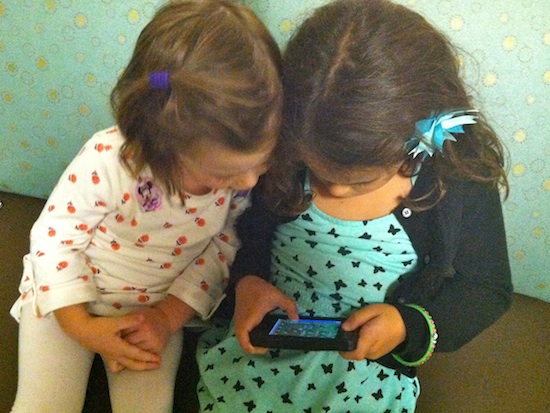
According to a really scary quote from the American Academy of Child and Adolescent Psychiatry, children in the United States watch an average of three to four hours of television a day. This means that by the time of high school graduation, they will have spent more time watching television than they have in the classroom. Yikes!
While we are well educated on the detriments too much screen time can have on kids (attention problems, school difficulties, sleep and eating disorders, and obesity), we are surrounded by technology everyday, and it’s not always easy to compete with it and to enforce the amount of time our children spend with it. The American Academy of Pediatrics advises that kids’ screen time should be limited to two hours or less per day, with no screen time for those age 2 and younger. It’s a reasonable limit, especially when we consider the more productive, educational and outdoor activities kids could do doing instead of watching television or movies, or playing on the iPad or a video game player.
Here is some helpful advice for defining and enforcing screen time guidelines for your family. Included are helpful apps for you to harness of the power of technology to keep your kids from becoming too dependent on it.
- Create “screen-free” zones at home, including the dinner table and your child’s bed
- Always turn off the TV during meals and forbid personal electronics at the table. That means yours, too!
- Get to know the technology your kids are using, making sure parental controls are in place and you know exactly what they are seeing and doing online.
- Offer plenty of non-electronic formats such as books, newspapers and board games to choose instead of the screen, and make sure they are easily accessible.
- Review the established ratings systems for shows, movies and games to avoid inappropriate content, such as violence, explicit sexual content or glorified tobacco and alcohol use.
- Choose apps and sites with care so that your kids are spending their screen time with appropriate, quality entertainment, and make sure there are plenty of educational choices, along with the just for fun picks, available to them.
- Encourage kids to use time on their computer or tablet to investigate things that interest them, rather than simply playing games. National Geographic Kids is a good choice for an engaging site where kids can learn through play.
- Encourage vigorous physical activity for at least one hour a day. Kids who are active aren’t thinking about what they are missing on TV. Get kids involved in sports at an early age to keep them active.
- Share your screen time rules with your sitters. Many parents choose not to allow their child screen time when the sitter is there. Others provide specifics on which shows or sites are allowed and for how long a child can spend watching or playing.
- Save screen time for a special movie you or your sitter and the kids can watch together.
- Make use of educational apps geared toward limiting and managing your kids’ screen time and even incentivizing them to find other activities to keep busy. Here are two worthy of a download:
Screen Time: This app allows you to assign daily limit allowances for each child. Allowances can be set to repeat each day or accumulate based on your preference. Kids earn screen minutes by doing chores and good behavior. You can add, change, or remove tasks and rewards to fit yours and your kids’ needs.
DinnerTime: This is a parental control app that enables parents to restrict when children can use their smartphones and tablets. With the free app, parents can pause activity on a child’s device so that they can focus on things like homework, exercise and family time. To use the app, parents install it on the child’s device and enter in their phone number to link the two devices. Parents can then set specific break times, ranging from 30 minutes to three hours, when the device will be locked. A countdown screen displayed on the child’s device shows when they can use it again.
Technology is an important influence in our lives and in our children’s. It’s important that we embrace the value it adds, while also making sure our kids don’t become so dependent on it for entertainment that they miss out on exploring their own imagination and creativity and on learning to play independently. What are your thoughts on kids and technology? We’d love to hear from you!




